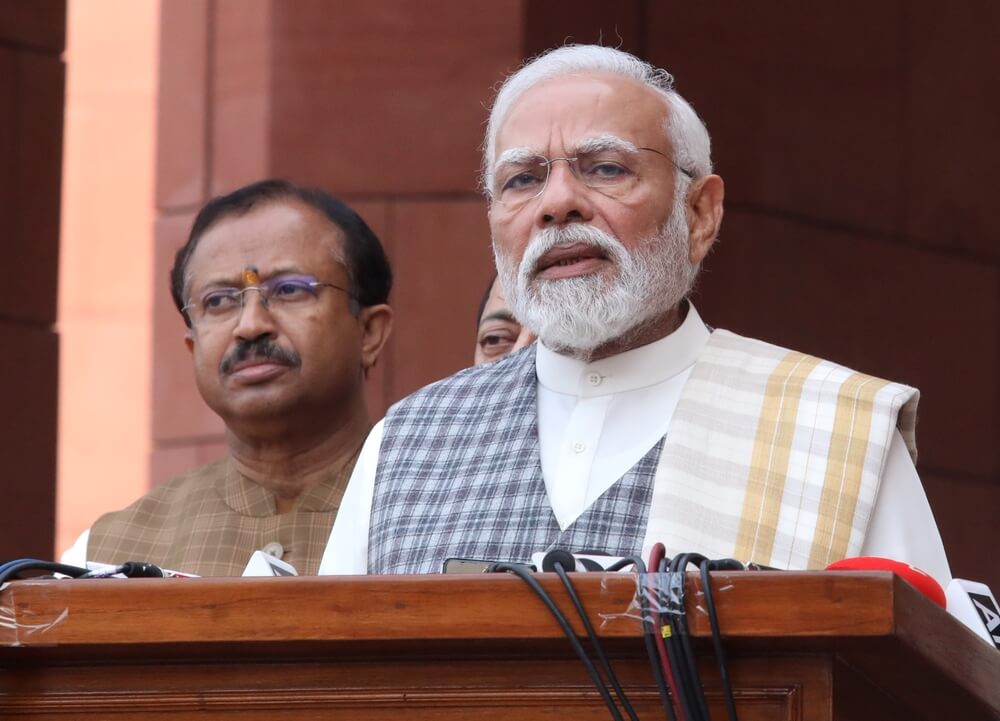Indian Prime Minister Narendra Modi's visit to Kyiv on Friday will be enough to balance India's policy towards the Ukraine crisis, the pendulum of which swung in Russia's favour just a month ago.
Western capitals viewed Prime Minister Modi's July visit to Moscow and his amicable talks with Vladimir Putin as India's deviation from a carefully maintained balance regarding Russia's invasion of Ukraine.
In particular, the timing of Modi's visit to Russia was irritating for Western leaders as it coincided with NATO's anniversary summit in Washington. What was even worse was that upon his arrival in Moscow, Prime Minister Modi faced the news of the Russian bombing of a children's hospital in Ukraine, resulting in the deaths of over 40 people.
“Anybody who believes in humanity is aggrieved at the loss of life in war or in terror attacks. Even so, it breaks our hearts to see innocent children get killed,” said PM Modi in front of the host in Moscow at the time.
Of course, he could not be silent about the enormous tragedy the Russian invasion army had caused, but he took care to avoid making the condemnation appear like a direct confrontation with the Russian leader.
A careful choice for a European tour
Prime Minister Modi's visit to Kyiv comes shortly after his meeting with Putin in Moscow and is therefore timely to demonstrate India's true balance in dealing with the war in Ukraine.
Furthermore, his stay in Poland prior to his trip to Ukraine rebalances India's stance towards NATO, a position he had previously strayed from during his trip to Moscow, which coincided with his Western allies' 75th NATO anniversary celebration in Washington.
The choice of Poland for the Indian Prime Minister's visit has a significant economic component, particularly in the defence industry
The choice of Poland for the Indian Prime Minister's visit has a significant economic component, particularly in the defence industry, as India is the largest global arms importer and is trying to diversify its suppliers to reduce its dependence on Russia.
But it is also a symbolic realignment of India's pendulum, given that Poland is one of the most significant NATO members in its strategy to strengthen the eastern flank and deter the Russian threat, as well as a growing power within the EU.
Does New Delhi want to lead the peace initiative?
On Friday, in Kyiv, Prime Minister Modi and Ukrainian President Zelensky will continue the dialogue from their last meeting at the G7 summit in Italy in June. This cordial conversation was characterised by India's role in finding a peaceful solution for Ukraine.
The talks in Kyiv will therefore primarily be a continuation with a similar tone. Global peace initiatives are on the defensive, especially after the conference in Switzerland in June, the results of which made virtually no progress.
India and its Prime Minister cannot be expected to spearhead a new initiative, especially given New Delhi's firm, non-aligned position. India traditionally does not want international factors to interfere in its internal affairs. Therefore, it does not put itself at the head of international coalitions to find a peaceful solution to global crises.
 The Indian diplomacy's room for manoeuvring will be greater after Narendra Modi's visit to Kyiv
The Indian diplomacy's room for manoeuvring will be greater after Narendra Modi's visit to Kyiv
However, New Delhi and Prime Minister Modi have a vested interest in using their global influence to achieve peace in Ukraine.
“This context presents an opportunity—if the Indian establishment chooses to pursue it—to initiate a new global conversation about bringing the warring parties to the negotiation table. India could play a small, though not insignificant, role in that process,” said Happymon Jacob, a professor at Jawaharlal Nehru University.
The Indian diplomacy's room for manoeuvring will be greater after Narendra Modi's visit to Kyiv, as it will strengthen its balanced position, which was weakened just a month ago.
Moreover, it is in India's interest, if only indirectly, to play the role of a peacemaker in Ukraine to amortise China's role in this regard. Given its equally favourable relations with both the Western bloc and Russia, New Delhi has a better chance than Beijing to gain acceptance as a partner on both sides of the conflict.
At the same time, both sides want to improve relations with India and increase their economic presence in the country, so they could be in favour of any peace proposal from New Delhi. Naturally, this is contingent upon Prime Minister Modi's government's interest in taking on this role.
“Modi has always been interested in Ukraine because, fundamentally, there is a strong Indian interest in ensuring that a stable European security architecture emerges that can meet the aspirations of both sides,” Harsh V. Pant, vice president at Observer Research Foundation, told CNBC.